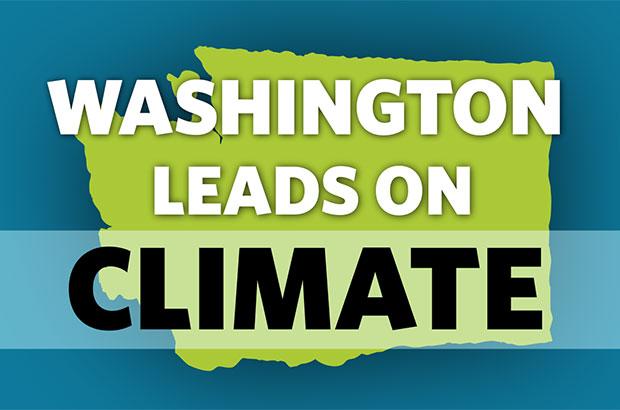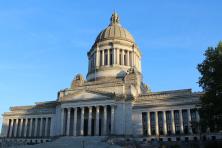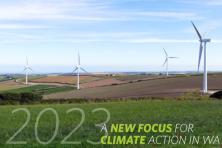Washington’s 2020 legislative session is a sprint—just 60 days from start to finish. Over the course of these eight weeks, legislators will consider hundreds of proposals, and we need your help to make sure that climate is a top priority on the agenda. As Australia burns and Indonesia floods, as our emissions continue to increase, as the impacts and threat of climate change continue to become more real in our everyday lives, we need our legislature to accelerate our transition off fossil fuels and to the clean, sustainable economy we know is within reach.
There are numerous bills that your Climate Solutions team is working on and monitoring this session. Here are five important pieces of legislation to highlight:
Clean Fuel Standard
The single most significant carbon reducing policy the Washington Legislature is considering this year is the Clean Fuel Standard. The policy passed the House in 2019 and didn’t make it through the Senate. The Standard would reduce approximately 6 million tons of climate pollution per year by 2035, and would help deploy as many as 700,000 electric cars, trucks and buses by 2030 according to an analysis by the Union of Concerned Scientists. Washington is the last jurisdiction on the West Coast without such a program—British Columbia, Oregon, and California have been reaping the benefits of clean fuels deployment for years.
In addition to its climate benefits, the transition off fossil fuels spurred by the Clean Fuel Standard will improve public health and quality of life throughout Washington. Transportation fossil fuels dump into our air tons of diesel particulates, NOx, volatile organic compounds like benzene, and other dangerous chemicals; directly contributing to respiratory disease like lung cancer and asthma. The potential to cut this pollution is the reason that medical organizations such as the Washington State Medical Association, the Washington Academy of Family Physicians, the American Lung Association, the Washington State Nurses Association and others have identified the Clean Fuel Standard as a legislative priority this year.
Consumer Choice for Fossil-Free Homes
Washington’s shareholder-owned electric utilities are currently allowed to provide financial help to their customers to purchase new clean, electric heat pumps and water heaters. Unfortunately, our customer-owned utilities don’t have clear authority from our legislature to do the same if the utility customer currently uses fossil gas to heat their home or building. This uneven playing field locks customers into continued use of expensive and unsafe polluting heat sources—wood stoves, heating oil, and fossil gas furnaces—that contribute to poor air quality, prevent us from achieving climate goals, and are often much more expensive to operate than clean and efficient electric alternatives. Even the newest fossil gas appliances release carbon monoxide, formaldehyde, and NOx into the homes of their owners, and half of homes with gas stoves that don’t have a range hood have indoor air quality that would be illegal under federal law if it happened outside.
Restoring a balance between electric utilities owned by shareholders and those owned by the public is a matter of fairness. If a customer wants to make the switch to a climate friendly, healthier, and cheaper-to-operate option, they should be able to get help from their utility no matter who owns it.
Zero Emissions Vehicle Mandate
Ten states have adopted laws that require auto manufacturers to provide electric vehicles to their residents and to achieve certain sales figures over time. Our neighbors in California, Oregon, Colorado and elsewhere have similar laws; it’s time for Washington to join the pack. Our state has some of the highest demand for EVs across the country, and our legislature has put millions of dollars into incentives, infrastructure and more. We need to make sure the auto industry does its part to help customers buy the zero emission vehicles they want.
Transportation for All
Climate Solutions will join with a range of partners to ensure that future transportation funding is climate smart and equitable. We need new progressive sources of revenue to build the system we need, we must expand our commitment to transit and help ensure that people have options outside of car reliance to get around, and we must guarantee that our revenue and spending proposals help reduce carbon, instead of our status quo reliance on fossil fuels. We’ll work with many stakeholders to set the state on sure footing with stable, growing sources of revenue dedicated to transporting people and goods in the most sustainable way possible.
Limiting Greenhouse Gas Pollution
In 2008 Washington State adopted greenhouse gas limits. As the climate crisis has accelerated and the science has improved, we’ve learned that these levels are insufficient to achieve a stable climate system. This year, Governor Inslee supports legislation that will call for 95% emission reductions compared to 1990 levels by 2050, alongside a net-zero emissions requirement that highlights the need for natural climate solutions that pull carbon out of the air.
There are numerous other policies to track, including a bill requiring companies like Uber and Lyft to use more electric vehicles, community solar support, and more. We need all of this in a short time frame—will you help us? Contact your legislators and tell them you expect them to pass the Clean Fuel Standard and other critical climate legislation this year.
We have no time to lose.
Image

Our plan for 2020: more climate progress in WA




